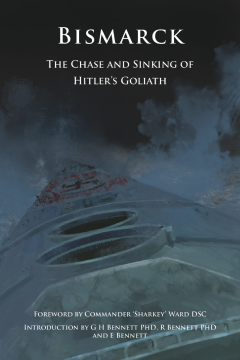
Additional Information
Book Details
Abstract
Sunk on her first and only war cruise, 27 May 1941, this great victory for the Royal Navy was also a human tragedy. Only 114 of her 2,200 crew survived the Royal Navy’s final storm of shells and torpedoes. Despite her short career, the story of Bismarck and the precise reasons for her loss have fascinated many and been the subject of controversy since 1941. The discovery of the wreck in June 1989 has only fuelled the debate. How did the Royal Navy stop the massive battleship? Was she sunk in the action or did her own crew scuttle her in a last act of defiance?
Bismarck contains the complete Battle Summary: how Hitler’s Goliath was located, pursued and attacked, featuring both German and British first-hand accounts. The foreword, by Commander ‘Sharkey’ Ward, contains pertinent quotes from Churchill on Britain’s dependence on her navy. The introduction, written by a team of historians, includes the Kriegsmarine’s purpose in building the ship, the Royal Navy’s tactics of destruction and the post war controversy.
The remains of Bismarck lie some 600 miles west of Brest at a depth of 15,700 feet. Such is the slow decay of the vessel that it is estimated that she will continue to stand as a monument to the fate of so many of her crew well into the 22nd Century. On the ocean bed around the wreck are hundreds of pairs of seamen’s boots – a final ghostly reminder of the men who once filled them.
Never previously published in this format, documents once stamped ‘secret’ have been sourced from Britannia Royal Naval College’s Library. These include reports and plans drawn up by serving Royal Navy Officers during and immediately after World War II. Britannia Naval Histories of World War II also contain Germany’s recorded view of action against the British, with Hitler’s comments, as they were typed and filed at the time: the Fuehrer Conferences. Specially commissioned artwork apears on each front cover.
Despite the many accounts of the Bismarck action the story bears retelling and it is of interest to read a contemporary account written by Royal Naval officers aiming "to learn the lessons for the future from recently concluded operations."
Roger Bunbury
